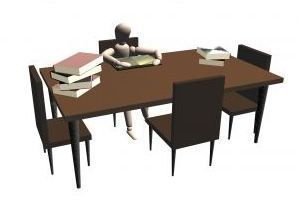Sixth Grade Homeschool Curriculum Guidelines for Assessing Mastery of Math, Language Arts, Science and Social Studies
Page content
It is helpful if you go over these curriculum guidelines at the beginning of the school year so you can plan on what to teach your child. Then use the information at the end of the school year to determine if your child has successfully learned what they needed to before moving on to a seventh grade curriculum.
Math
- Master adding, subtracting, multiplying, and dividing using both long hand and a calculator.
- Ability to add, subtract, multiply and divide decimals.
- Ability to add, subtract, multiply and divide fractions.
- Ability to add, subtract, multiply and divide percentages.
- Understand ratios.
- Master greater than, less than, and equal too when comparing any type of number.
- Understand the four types of angles (straight, obtuse, right, and acute).
- Understand the types of triangles (obtuse, right, equilateral, and isosceles).
- Able to find the perimeter.
- Able to find the area.
- Able to find the volume.
- Master liquid and dry measurements.
- Find distances on a map utilizing the scale.
- Begin to understand numbers to a certain power (example 10 to the 3rd power is 10 x 10 x 10= 1,000).
- Begin to understand the mean, median, and the mode.
- Begin to understand statistics.
- Beginning to understand probability.
- Ability to complete problems that have more than one step.
- Estimate.
- Change fractions to decimals and percentages and vice versa.
Language Arts
- Memorize twenty new spelling words per week.
- Memorize twenty new vocabulary words per week.
- Keep a daily journal with a new topic to write on each day.
- Discuss current events.
- Write your own newspaper article.
- Ability to comprehend books read.
- Ability to point out plots, characters, settings, and conclusions.
- Ability to write a book report.
- Ability to give an oral book report.
- Ability to write a rough draft, edit the draft and turn in a final paper.
- Ability to read 6th grade readers fluently and with emphasis.
- Ability to write a paper on nonfiction citing sources.
- Master proper grammar and be able to diagram sentences.
- Understand different types of poems and write your own poem for each type.
- Begin to understand a debate, how to prepare for one, and how to present your facts.
Science
- Ability to use the scientific method to conduct an experiment.
- Ability to keep track of the scientific method and what you are doing each step of the way in a notebook.
- Ability to use the tools needed to conduct the experiment (know the names, how to use them, and how to read them).
- Ability to conclude whether your hypothesis was correct or not. List why it was correct, or what factors led to you begin wrong.
- Ability to organize and classify information.
- Understand electrical energy and currents.
- Begin to study human organs and tissues.
- Begin to study the human circulatory and respiratory systems.
- Begin to understand genetics. What have you learned from your parents vs. what you have inherited from your parents?
- Continue studying ecosystems, but in more depth.
- Learn about animals that are going extinct.
- Discuss the ozone layer.
- Understand what weather is and what a climate is. How the two are related and how are they different.
- Continue to study eclipses.
- Make a model of the solar system.
- Discuss the effects of weather in different parts of the world.
Social Studies
- Discuss elections and how they work.
- Discuss how laws are made and changed.
- Research laws from old and compare them to the laws you have today.
- Discuss citizenship and participate in a community service project (clean up the beach one day, etc.).
- Discuss various cultures and point out how they have influenced America.
- Discuss inventions and write a report on an inventor.
- Create a time line.
- Learn about trade and how it benefits America.
- Discuss what qualities are needed to in a good leader.
- Discuss what qualifications must be met in order to run for the Presidency.
- Discuss how technology has benefited society.
- Be able to identify the countries found in Europe on a blank outline.
- Be able to identify all the states in America on a blank outline.
- Read the constitution of the United States in full.
- Pick a country to study and do a report on it. Include its governmental structure, religious affiliation, customs, traditions, and important holidays.
